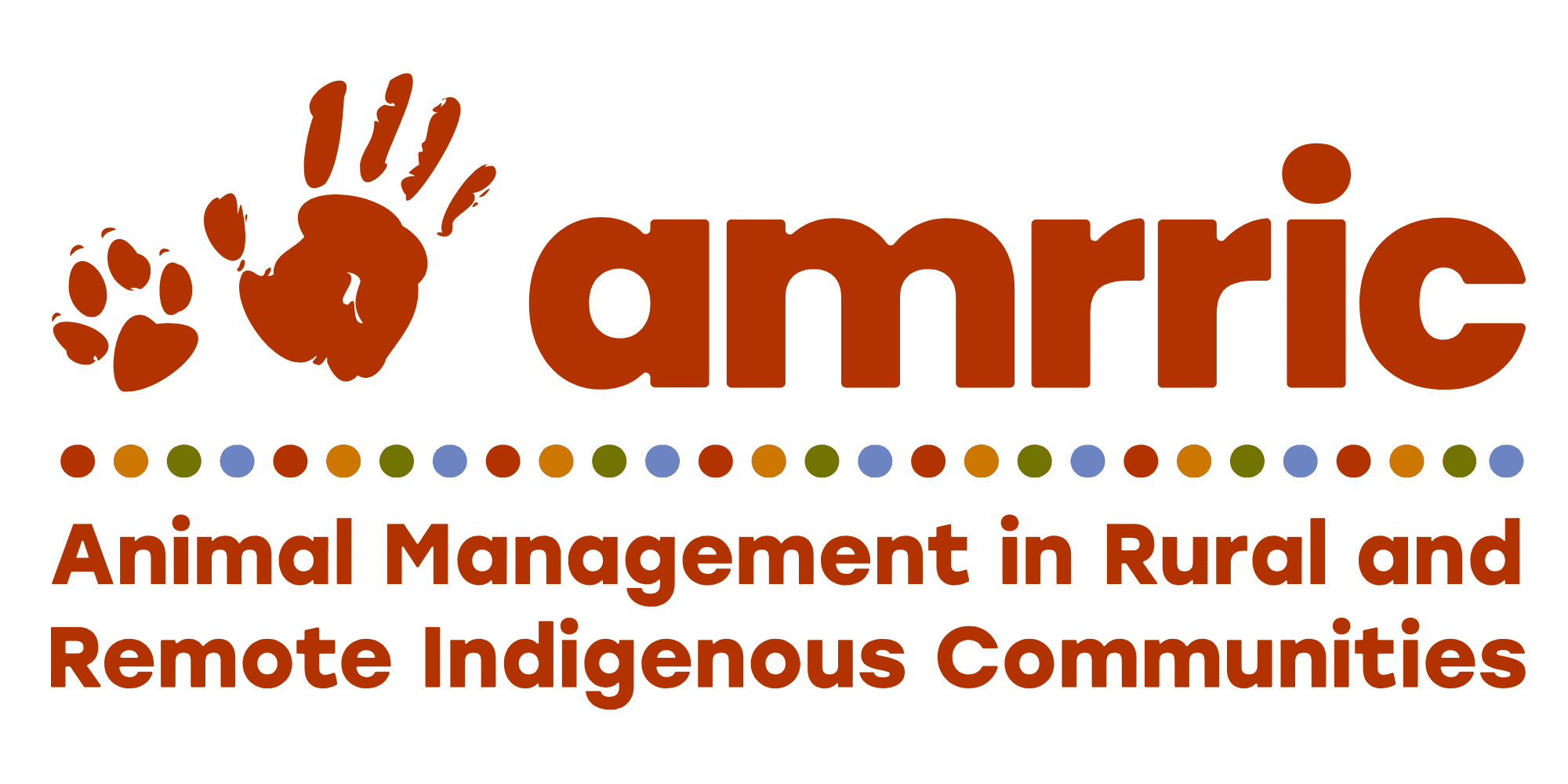Volunteer
Volunteering with AMRRIC is a unique opportunity to use your skills where there is great need, to truly benefit both animals and people. AMRRIC engages volunteers in order to increase our capacity to provide greater benefits to Aboriginal & Torres Strait Islander communities and their animals, promote reconciliation, and promote and raise awareness of our work.
Volunteer
Volunteering with AMRRIC is a unique opportunity to use your skills where there is great need, to truly benefit both animals and people. AMRRIC engages volunteers in order to increase our capacity to provide greater benefits to Aboriginal & Torres Strait Islander communities and their animals, promote reconciliation, and promote and raise awareness of our work.
Our Work
There are many reasons to volunteer for AMRRIC:
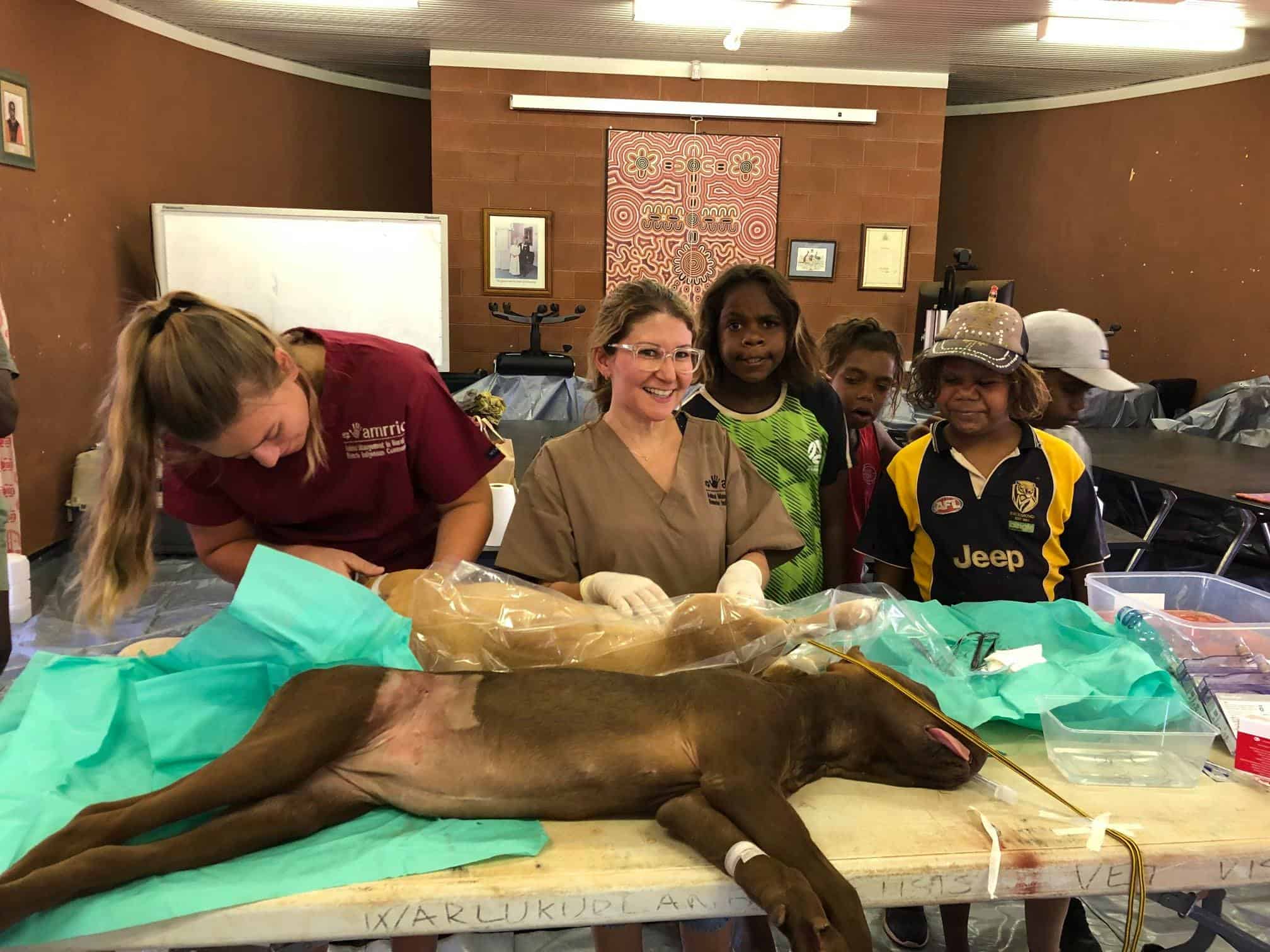
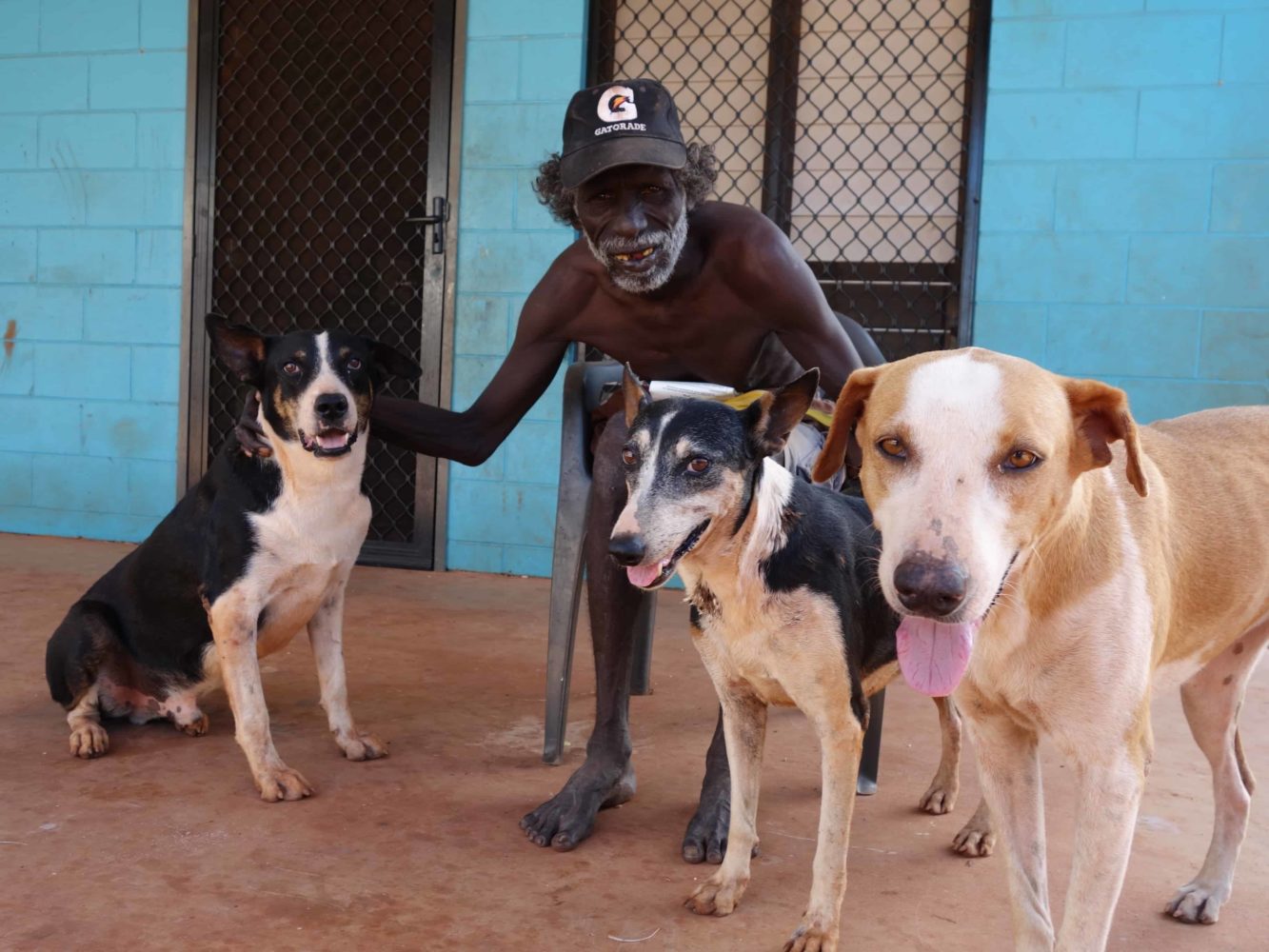
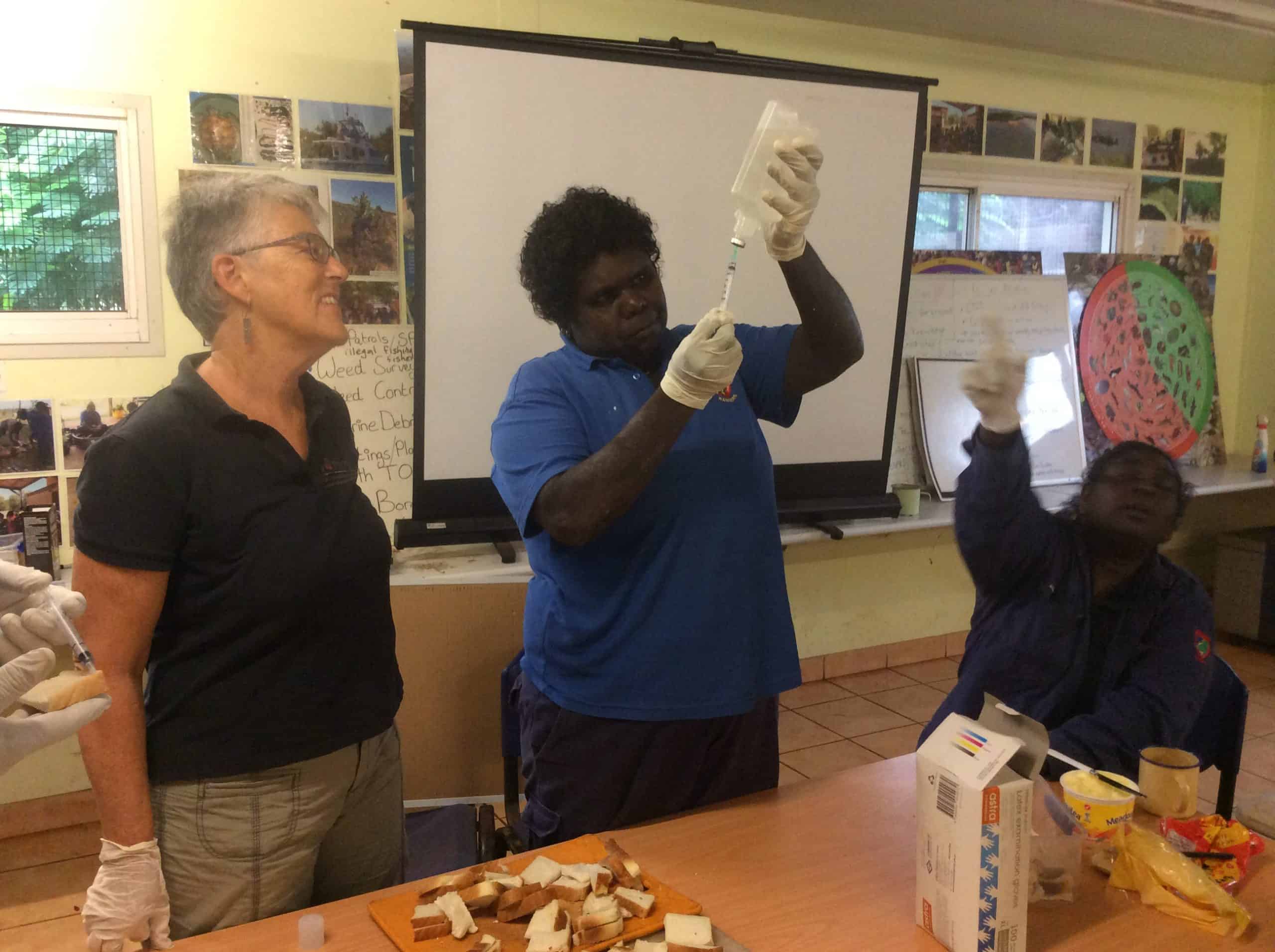
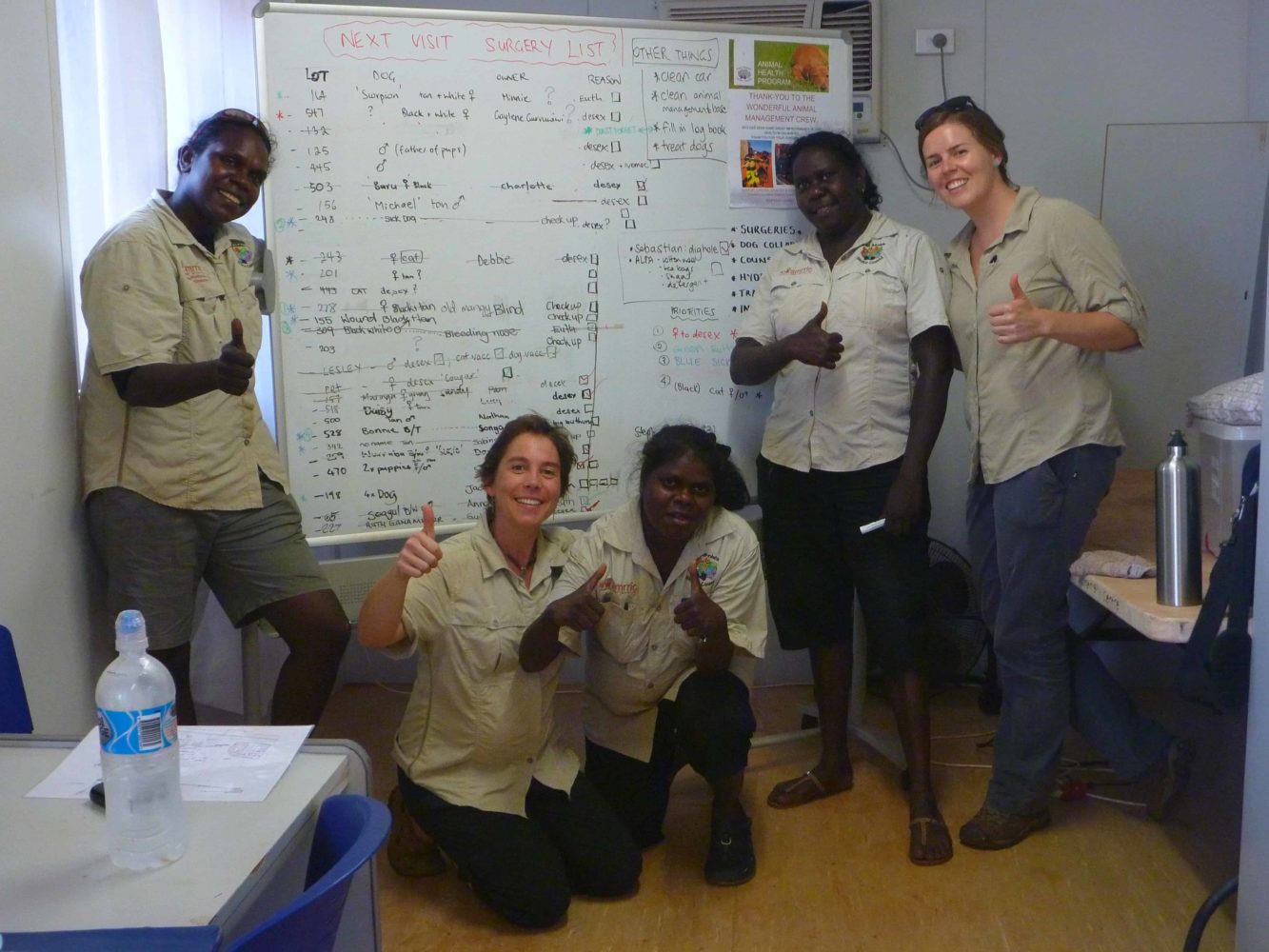

If you would like to volunteer on a veterinary program please read the following FAQs. If you’d like to volunteer your skills outside of participation on a veterinary program, please get in touch with us to discuss the possibility of tailoring a role for your skillset.
Veterinary Program Volunteers
Each year a small number of veterinary volunteers (i.e. vets, vet nurses, vet students and data collectors) have the opportunity to assist in delivering veterinary services in Indigenous communities in some of the most remote areas of Australia. In these surroundings, the volunteer’s experience is full of challenges – physical, mental and sometimes emotional – but the work provides a unique insight, and can bring great satisfaction.
Veterinary volunteers work within an AMRRIC affiliated veterinary program to deliver veterinary services to the companion animals of rural and remote Aboriginal and Torres Strait Islander communities. Key activities of AMRRIC affiliated veterinary programs include:
- Companion animal population control through surgical and chemical desexing procedures;
- Parasite treatments to both improve animal health and reduce potential zoonotic disease transmission;
- Community education designed to inform local communities about the importance and integrated nature of animal, environmental and human health;
- The collection of animal population and treatment data.
All of AMRRIC’s work is based on central philosophies that determine the way it engages with communities as well as the standards of services it provides. Information on AMRRIC’s philosophies can be found here.
How do I become an AMRRIC veterinary volunteer?
For volunteers wishing to participate on a veterinary program (i.e. veterinary volunteers), please read the following FAQs and some of our returned volunteers’ stories before completing our Veterinary Volunteer Application Form. Once your application has been approved you will go on the mailing list to receive notice of upcoming veterinary volunteer opportunities; it is then up to you to contact AMRRIC’s volunteer coordinator to express your interest in a particular advertised opportunity.
Once you have registered your interest in an advertised opportunity, we may ask you to have two referees complete an online reference form. We may also arrange a time to speak with you about your interest in volunteering. Once this credentialing is completed, we typically work with the principal vet for the program to select the most appropriate candidate/s.
In most cases, following acceptance to participate on a program, you will be asked to complete background reading, undertake your own research about the history of the community/communities you’ll be visiting, and sign various AMRRIC agreements. You will also be responsible for arranging your own travel to the nominated meeting point for the program, as well as any professional requirements (e.g. veterinary board registration).
Do I need a Working With Children Clearance
For volunteer opportunities in all other states, in most instances a Working With Children Clearance is not necessary, as AMRRIC volunteers usually do not meet the eligibility requirements. You will be advised if a Working With Children Clearance is required for any program in states other than the NT.
Am I covered by AMRRIC's insurance?
- Limited Personal Accident – the amounts of insurance are only supplementary amounts and a long distance from covering e.g. a vet’s loss of income.
- Public Liability – but NOT for professional malpractice, i.e. NOT covering veterinary acts.
Where possible, professionals are best covered by their own work insurance for a more comprehensive and satisfactory insurance. Students are best covered by the insurance of their university.
Who will I work with?
Other vet, vet nurse, vet student or data collector volunteers may also be present on the program, however veterinary program teams are typically no larger than 6 people.
What does a veterinary volunteer do on an AMRRIC affiliated veterinary program?
Veterinarians; please note that on remote community programs, flank speys are often preferentially performed over mid-line speys. While each surgical approach is determined by clinical judgement on a case by case basis, flank speys often pose lower risk of post-surgical complication in remote community contexts. AMRRIC and our partner veterinarians understand that many vets have limited experience performing flank speys. If you are interested in volunteering with AMRRIC but have concerns about the prospect of performing flank speys, please get in contact with us to discuss your trepidations. Concerns about performing flank speys needn’t deter you from volunteering; AMRRIC staff and our partner veterinarians are more than willing to support and mentor volunteers to use surgical approaches that they are comfortable with, and competent in performing.
Where do AMRRIC volunteer opportunities occur?
Almost all of AMRRIC’s volunteer opportunities occur in remote locations requiring many hours travel by unsealed road or small plane. There may be no mobile reception and volunteers unfamiliar with Indigenous communities can feel very isolated and sometimes experience ‘culture shock’. Prior to application, it is important to consider the context in which AMRRIC volunteers work, and decide whether or not volunteering on a remote veterinary program is for you.
What is the vet suite like?
What sort of cultural and contextual considerations do I need to bear in mind?
For those unfamiliar with remote Indigenous communities, travelling to and staying in such communities can be a very confronting experience. The cultural differences between Indigenous communities and mainstream Australia are vast; remote Indigenous communities are often compared to developing countries due to their relative poverty and associated living conditions. Witnessing these conditions and the extent of human and animal health disparities can significantly impact on visitors’ mental health. Whilst experiencing such conditions is very different from reading about them, it is essential that prospective AMRRIC volunteers do as much as possible to prepare themselves. It is therefore critical that prospective volunteers complete all of the recommended reading in the induction material, as well doing their own research to gain a better understanding of the cultural and socio-economic realities that they may face whilst volunteering.
More information regarding cultural and contextual considerations can be found in AMRRIC’s Cultural Orientation Handbook.
What is the accommodation and food like?
Are there any health requirements I must meet to be eligible to participate as a volunteer?
An up-to-date Tetanus vaccination status is essential due to the remote nature and risk involved in handling animals. Volunteer applicants are recommended to have had a Q fever vaccination and should seek guidance from their GP regarding the need for booster Tetanus vaccinations and other vaccinations.
What is the frequency and duration of volunteer opportunities?
Veterinary program suitable for volunteers are usually 4-5 days in duration, plus travel time, but can vary from 3 -10 working days.
What is the cost of volunteering?
Other costs to factor in include:
- NT Working With Children Clearance application fee ($5 as of Jun 2017) if volunteering on a program within the NT.
- Any fees associated with veterinary registration in the state or territory of the program. (While the application fees for veterinary volunteers are usually waived, some boards require a letter of good standing from the veterinarian’s existing veterinary board. If a letter of good standing is required, the fee for the production of this document is payable by the volunteer.)
All other expenses associated with volunteering is at the volunteer’s own expense.
Does AMRRIC take student vet and vet nurses as volunteers on One Health Programs?
AMRRIC does take student vets at the discretion of the principal veterinarian and in accordance with the state or territory veterinary board and the university in question.
For veterinary volunteer opportunities, AMRRIC only takes veterinary students who are in their clinical years of study and have participated in practical surgical training through their university. It should be noted that despite the experience of the supervising principal vet, AMRRIC volunteer opportunities are not designed or intended as veterinary training opportunities. Veterinary student volunteers must understand that the decision regarding whether or not they will be permitted to perform supervised surgeries is entirely at the discretion of the principal vet. If the principal vet is not confident in the veterinary student’s abilities, they will not be permitted to perform surgeries for the duration of the program, and will instead be asked to act in the role of assistant.
Veterinary students (of all years) with vet nursing experience may apply for vet nurse volunteer opportunities. Veterinary students (of all years) without vet nursing experience may apply for data collector volunteer opportunities. Please note that vet students acting as nurses or data collectors will not be permitted to perform surgeries.
As mentioned previously, volunteer opportunities are erratic and can be at short notice, so planning ahead to fit into student schedules is not often possible.
For vet nurse students:
On most occasions, due to the limited availability of transport and accommodation, and need to maximise on-the-ground capacity, AMRRIC does not take inexperienced vet nurses in vet nurse volunteer roles. AMRRIC vet nurse volunteers must have a minimum of 6 months experience working as a veterinary nurse in a clinical setting, as well as basic veterinary nursing skills (e.g. anaesthetic monitoring and surgical assistance) and a basic understanding of animal behaviour. Vet nurse students without clinical vet nursing experience may however apply for data collector volunteer opportunities.
Are there volunteer opportunities for people who are not veterinarians or vet nurses?
What makes a successful veterinary volunteer?
- Cultural sensitivity and respect;
- Flexibility, adaptability and a willingness to cope with different environments;
- Patience, professionalism and enthusiasm;
- The ability to work under difficult conditions – flies, dust, heat – and often with an audience of community members;
- Self-motivation and the ability to work co-operatively as part of a diverse team;
- A basic understanding of dog behaviour and skills to recognize and avoid potentially dangerous situations;
- For vets, sound surgical skills with experience performing flank speys desirable (but not essential);
- Experience in community development programs in remote communities or international context;
- Experience in Indigenous communities.
